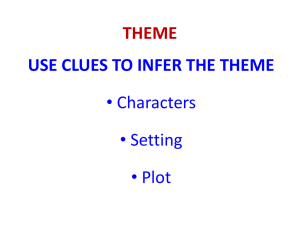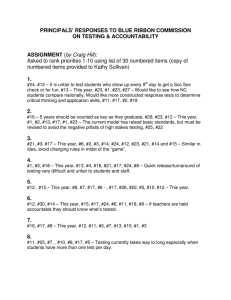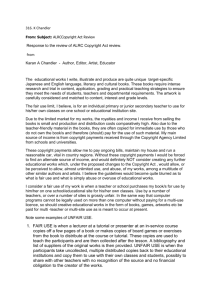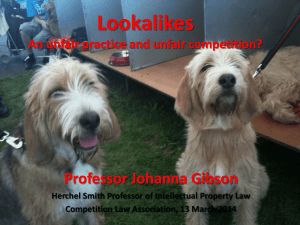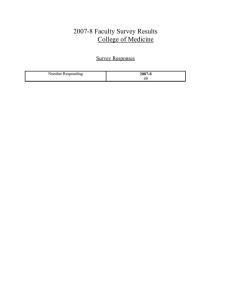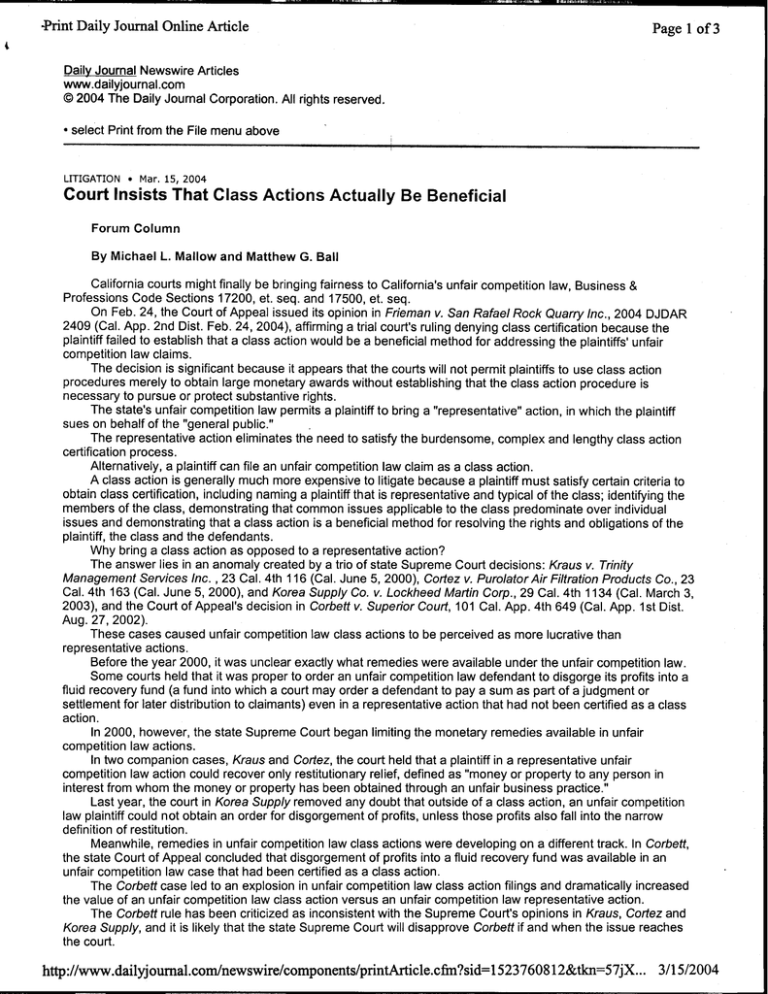
,
-Print Daily
Journal
Online
Article
Dail~ Journal Newswire Articles
www.dailyjournal.com
@ 2004 The Daily Journal Corporation.
.select
Page I of3
All rights reserved.
Print from the File menu above
i
I'
LITIGATION.
Mar. 15, 2004
Court Insists
That Class Actions
Actually
Be Beneficial
Forum Column
By Michael L. Mallow and Matthew G. Ball
California courts might finally be bringing fairness to California's unfair competition law, Business &
Professions Code Sections 17200, et. seq. and 17500, et. seq.
On Feb. 24, the Court of Appeal issued its opinion in Frieman v. San Rafael Rock Quarry Inc., 2004 DJDAR
2409 (Cal. App. 2nd Dist. Feb. 24, 2004), affirming a trial court's ruling denying class certification because the
plaintiff failed to establish that a class action would be a beneficial method for addressing the plaintiffs' unfair
competition law claims.
The decision is significant because it appears that the courts will not permit plaintiffs to use class action
procedures merely to obtain large monetary awards without establishing that the class action procedure is
necessary to pursue or protect substantive rights.
The state's unfair competition law permits a plaintiff to bring a "representative" action, in which the plaintiff
sues on behalf of the "general public."
The representative action eliminates the need to satisfy the burdensome, complex and lengthy class action
certification process.
Alternatively, a plaintiff can file an unfair competition law claim as a class action.
A class action is generally much more expensive to litigate because a plaintiff must satisfy certain criteria to
obtain class certification, including naming a plaintiff that is representative and typical of the class; identifying the
members of the class, demonstrating that common issues applicable to the class predominate over individual
issues and demonstrating that a class action is a beneficial method for resolving the rights and obligations of the
plaintiff, the class and the defendants.
Why bring a class action as opposed to a representative action?
The answer lies in an anomaly created by a trio of state Supreme Court decisions: Kraus v. Trinity
Management Services Inc. ,23 Cal. 4th 116 (Cal. June 5, 2000), Cortez v. Purolator Air Filtration Products Co., 23
Cal.4th 163 (Cal. June 5,2000), and Korea Supply Co. v. Lockheed Martin Corp., 29 Cal. 4th 1134 (Cal. March 3,
2003), and the Court of Appeal's decision in Corbett v. Superior Court, 101 Cal. App. 4th 649 (Cal. App. 1 st Dist.
Aug. 27,2002).
These cases caused unfair competition law class actions to be perceived as more lucrative than
representative actions.
Before the year 2000, it was unclear exactly what remedies were available under the unfair competition law.
Some courts held that it was proper to order an unfair competition law defendant to disgorge its profits into a
fluid recovery fund (a fund into which a court may order a defendant to pay a sum as part of a judgment or
settlement for later distribution to claimants) even in a representative action that had not been certified as a class
action.
In 2000, however, the state Supreme Court began limiting the monetary remedies available in unfair
competition law actions.
In two companion cases, Kraus and Cortez, the court held that a plaintiff in a representative unfair
competition law action could recover only restitutionary relief, defined as "money or property to any person in
interest from whom the money or property has been obtained through an unfair business practice."
Last year, the court in Korea Supply removed any doubt that outside of a class action, an unfair competition
law plaintiff could not obtain an order for disgorgement of profits, unless those profits also fall into the narrow
definition of restitution.
Meanwhile, remedies in unfair competition law class actions were developing on a different track. In Corbett,
the state Court of Appeal concluded that disgorgement of profits into a fluid recovery fund was available in an
unfair competition law case that had been certified as a class action.
The Corbett case led to an explosion in unfair competition law class action filings and dramatically increased
the value of an unfair competition law class action versus an unfair competition law representative action.
The Corbett rule has been criticized as inconsistent with the Supreme Court's opinions in Kraus, Cortez and
Korea Supply, and it is likely that the state Supreme Court will disapprove Corbett if and when the issue reaches
the court.
3/15/2004
.Print Daily
Journal
Online
Article
Page 2 of3
\
In the meantime, however, the anomalous result in Corbett, unfortunately, distorts current unfair competition
law practice.
Frieman, however, may, thankfully, limit the effect of Corbett and may reduce the incentive to file unfair
competition law class actions by requiring plaintiffs to satisfy two significant procedural requirements before an
unfair competition law case will be certified as a class action.
First, Frieman requires a plaintiff to demonstrate that disgorgement of profits has a "well-defined nexus to
restitutio nary damages." Second, Frieman bars plaintiffs from seeking class relief when the only benefit to be
obtained from class treatment is the disgorgement of profits into a fluid recovery fund.
The Frieman plaintiffs lived near defendant San Rafael Rock Quarry. Relying on numerous claimed violations
of state and local laws and regulations, the plaintiffs alleged that the San Rafael Rock Quarry violated the
"unlawful" prong of the unfair competition law.
The plaintiffs sought injunctive relief and, citing Corbett, disgorgement of any profits derived by San Rafael
Rock Quarry as a result of its allegedly unlawful activity. The plaintiffs could not demonstrate that they were
entitled to restitution under Kraus or Cortez.
Therefore, the only way the plaintiffs could hope to obtain a monetary recovery was through disgorgement of
profits under Corbett.
Rejecting plaintiffs' reliance on Corbett, the court stated that unlike the Frieman plaintiffs, the Corbett plaintiffs
had individual claims for restitution. The Corbett class "sought a fluid recovery for disgorgement of moneys that
had a well-defined nexus to restitutionary damages" -a factor absent in Frieman.
The following hypothetical further illustrates Frieman's potential impact. A representative plaintiff sues a
defendant under the unfair competition law for improperly selling its clients' private information.. but cannot
demonstrate entitlement to any monetary restitution because the defendant did not obtain any money from the
plaintiff as a result of selling the information.
Before Frieman, this plaintiff could have sought to certify a class action and, thereby, potentially obtain
disgorgement of all sums made from the sale of the private information into a fluid recovery fund.
After Frieman, a defendant can now argue that a disgorgement class would be improper because no welldefined nexus exists between the sums generated from the information sales and the restitution sought.
Frieman also requires plaintiffs to demonstrate benefits to certification other than the ability to obtain
disgorgement of profits into a fluid recovery fund.
Demonstrating that a class action is superior to a representative unfair competition law action is more difficult
than one might think. Under Frieman, the "overarching legislative concern in establishing the [unfair competition
law] was to provide a streamlined procedure to prevent unfair competition."
Therefore, a plaintiff seeking the more burdensome route of class certification must establish an advantage to
proceeding as a class action over proceeding as a representative action.
The Frieman court found that the plaintiffs could "use the streamlined provisions of the [unfair competition
law] to obtain an injunction against the Quarry's illegal acts."
The only advantage to the class procedure, as opposed to a representative action, was plaintiffs' "hope of
obtaining a remedy that the [unfair competition law] does not provide in a representative action" -disgorgement of
profits into a fluid recovery fund.
The court brushed aside the plaintiffs' assertion that disgorgement was needed to deter future wrongdoing,
noting that "[w]hile termination of a defendant's alleged wrongdoing is a factor to be considered, it does not warrant
group action for damage when the members will not recover damage."
This requirement, like the well-defined nexus requirement, suggests that certification of an unfair competition
law class will be extremely difficult unless the plaintiff can demonstrate that the putative class members have
restitutionary claims, as defined by Kraus and Cortez, and there is some benefit to proceeding as a class action
rather than a representative action.
Although Frieman is arguably narrow, the decision may. nonetheless, signal a return to the original intent
behind the unfair competition law.
In enacting the unfair competition law, the Legislature intended to balance the need for a relatively
economical and efficient method for addressing unfair business practices, while limiting the monetary impact unfair
competition law actions could have on defendant businesses.
The court's decision in Corbett upset this balance, but Frieman gives defense counsel new tools to help
restore this balance in certain cases.
For many years, California's unfair competition law has been used by well-intentioned individuals and entities
as an effective and efficient tool to address unlawful and deceptive business practices.
In essence, Business & Professions Code Section 17200 was initially framed in its broad, sweeping language
to enable judicial tribunals to deal with the innumerable new schemes that the fertility of man's invention would
contrive.
Because of its breadth and sometimes Draconian remedies, however, the unfair competition law also has
been an abusive tool used to extract or extort settlements that are not commensurate with the actual harm, if any,
that may have been caused by a business' actions. When abused, therefore, the unfair competition law is certainly
unfair.
Perhaps Frieman signals a return to the balance that was initially envisioned by the Legislature -a balance
that provided an effective tool to protect against unfair competition without becoming a tool of unfair competition.
3/15/2004
.print Daily JournalOnline Article
Page3 of3
J
Michael L. Mallow is a partner in the Los Angeles office of Kirkpatrick & Lockhart. Matthew G. Ball is an
associate in the firm's San Francisco office.
**********
@ 2004 Daily Journal Corporation. All rights reserved.
3/15/2004

